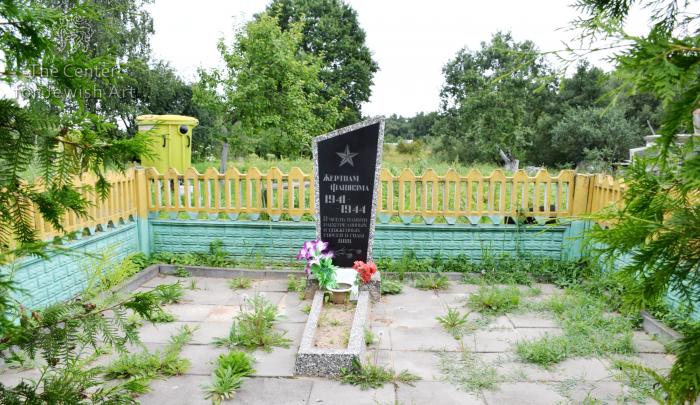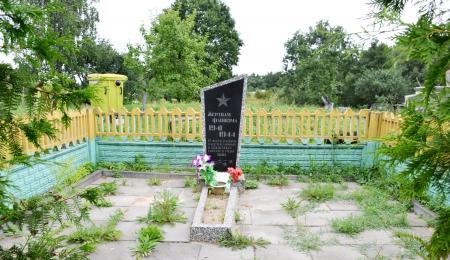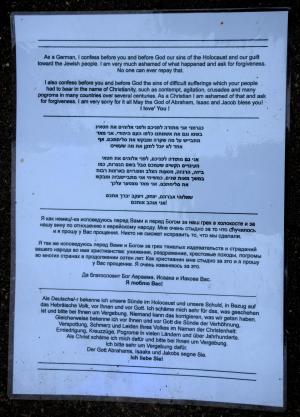Obj. ID: 34071
Jewish Funerary Art Holocaust memorial at the Killing Site in Lipen', Belarus, 2009

Memorial name
No official name.
Who is Commemorated?
The Lipen' Jewish victims of the Holocaust.
Description
The monument on Kun'ko St., commemorating the killing site of the Lipen' Jews, is shaped like an irregular tombstone stele. At the top of it, there is a Soviet five-pointed star, while its bottom is adorned with two carnations. The monument bears a Russian inscription.
At the base of the monument, there is a standard piece of paper covered with a transparent film that bears four almost identical inscriptions: in English, Hebrew, Russian, and German.
The territory of the monument is paved and surrounded by a fence.
Inscription
On the monument, in Russian:
Жертвам
фашизма
1941 -
- 1944
В честь памяти
расстрелянных
и сожженных
евреев в годы
ВОВ
Translation: To the victims / of fascism / 1941 - / - 1944 / In honor of the memory / of the shot / and burned to death / Jews in the years of / the Great Patriotic War.
Commissioned by
The local authorities.
sub-set tree:
Lipen was occupied by the Germans on June 30, 1941. Almost immediately, all the Jews were forced into a ghetto encompassing a couple of houses in the area close to the bank of the Svisloch River. 200 Jews were murdered in a single operation carried out either in July-August or October 1941, when they were forced into a house and burned alived [Yad Vashem: The Untold Stories].
Memorialization activities in Lipen' started in the 1970s [Smilovitsky] or, according to other sources, in 1983 [Al'tman, p. 528] when a modest obelisk at the killing site of the local Jews on Kun'ko St. was erected. It was dedicated to "the victims of fascism" without mentioning the Jewish nationality.
In 2009, on the initiative of the local authorities, the old monument was replaced by the present one: now its inscription indicates the victims' nationality [Smilovitsky].
At the base of the monument, there is a standard piece of paper covered with a transparent film. It is left there by an anonymous German citizen [Smilovitsky]. The paper bears four inscriptions - in English, Hebrew, Russian, and German - that express repentance for the Holocaust and other sufferings. The inscriptions read as follows:
In English
As a German, I confess before you and before God our sins of the Holocaust and our guilt
toward the Jewish people. I am very much ashamed of what happened and ask for forgiveness.
No one can ever repay that.
I also confess before you and before God the sins of difficult sufferings which your people
had to bear in the name of Christianity, such as contempt, agitation, crusades and many
pogroms in many countries over several centuries. As a Christian I am ashamed of that and ask
for forgiveness. I am very sorry for it all May the God of Abraham, Isaac and Jacob bless youl [you]
I love' [love] You!
In Hebrew
כגרמני אני מתודה לפניכם ולפני אלוהים את חטאינ[ו]
בשוא[ה] וגם את אשמתנו כלפו העם היהודי. אני מאד
מתבייש על מה שקרה ומבקש את סליחתכם. אף
אחד לא יכול לתקן את מה שעשינו
אני גם מתודה לפניכם, לפני אלוהים את חטאי
העינויים הקשים שעמכם סבל בשם הנצרות, כמו
ביזה, הרגזה, מסעות הצלב ופוגרו[מ]ים בארצות רבות
במשך מאות שנים. כמשיחי אני מתבישבזה [מתבייש בזה] ומבקש
את סליחתכם. אני מאוד מצטער עלכך [על כך]
שאלוהי אברהם, יצחק, ויעקוב יברך אתכם
! אני אוהב אותכם [!]
Translation: As a German I confess before you and before God our sins / in the Holocaust and our guilt / toward the Jewish people. I am very much / ashamed of what happened and ask for your forgiveness. No / one can ever repay what we did / I also confess before you, before God the sins / of hard sufferings that your people bore in the name of Christianity, such as / contempt, agitation, crusades and pogroms in many countries / over hundreds of years. As a Christian I am ashamed of that and ask / for your forgiveness. I am very sorry for it / May the God of Abraham, Isaac and Jacob bless you / I love you!
In Russian
Я как немец/-ка исповедуюсь перед Вами и перед Богом за наш грех в холокосте и за
нашу вину по отношению к еврейскому народу. Мне очень стыдно за то что случилось
и я прошу у Вас прощения. Никто не сможет исправить то, что мы сделали.
Я так же исповедуюсь перед Вами и Богом за грех тяжелых издевательств и страданий
вашего народа во имя христианства: унижения, раздражение. крестовые походы, погромы
во многих странах на продолжении сотен лет. Как христианин мне стыдно за это и я прошу
у Вас прощения. Я очень извиняюсь за это.
Да благословит Бог Авраама, Исаака и Иакова Вас.
Я люблю Вас!
Translation: As a German I confess before you and before God our sins / in the Holocaust and / our guilt toward the Jewish people. I am very much ashamed of what happened / and ask for your forgiveness. No one can ever repay what we did / I also confess before you and before God the sin / of hard humiliations and sufferings / of your people in the name of Christianity: contempt, agitation, crusades, pogroms / in many countries / over hundreds of years. As a Christian I am ashamed of that and I ask / for your forgiveness. I am very sorry for it / May the God of Abraham, Isaac and Jacob bless you. / I love you!
In German
Als Deutsche/-r bekenne ich unsere Sünde in Holocaust und unsere Schuld, in Bezug auf
das Hebräische Volk, vor Ihnen und vor Gott. Ich schäme mich sehr für das, was geschehen
ist und bitte bei Ihnen um Vergebung. Niemand kann das korrigieren, was wir getan haben.
Gleichenweise bekenne ich vor Ihnen und vor Gott die Sünde der Verhöhnung,
Verspottung, Schmerz und Leiden Ihres Volkes Im Namen der Christenheit:
Emiedrigung, Kreuzzüge, Pogrome in vielen Ländem und über Jahrhunderte.
Als Christ schäme ich mich dafür und bitte bei Ihnen un Vergebung.
Ich bitte sehr um Vergebung dafür.
Der Gott Abrahams, Isaaks und Jakobs segne Sie.
Ich liebe Sie!
Translation: As a German, I confess before you and before God our sins of the Holocaust and our guilt toward the Jewish people. I am very much ashamed of what happened and ask for forgiveness. No one can ever repay that. I also confess before you and before God the sins of difficult sufferings which your people had to bear in the name of Christianity, such as contempt, agitation, crusades and many pogroms in many countries over several centuries. As a Christian I am ashamed of that and ask for forgiveness. / I am very sorry for it all. May the God of Abraham, Isaac and Jacob bless you / I love you!
Il'ya, Al'tman (ed.), Kholokost na territorii SSSR (Moskva: ROSSPEN, 2011), p. 528.
"Lipen,"
Untold Stories - Murder Sites of Jews in Occupied Territories of the USSR (Yad Vashem project), https://collections.yadvashem.org/en/untold-stories/community/14621531-Lipen.
Smilovitskii, Leonid, "Po sledam evreiskikh kladbishch Belarusi: Belynichi," Zhurnal-gazeta "Masterskaia," ed. Evgenii Berkovich., https://club.berkovich-zametki.com/?p=54483 (accessed December 25, 2023)



